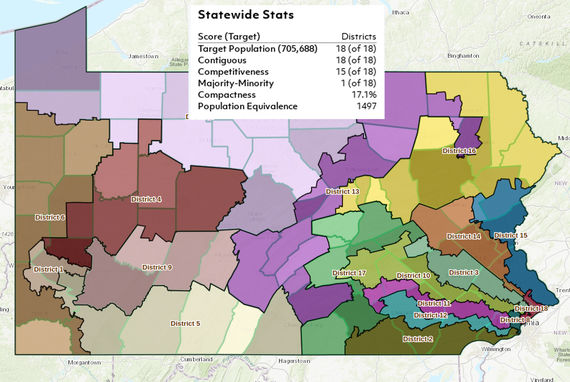Elise Lashinsky, 1st, Higher Ed-Central

About Elise Lashinsky: I'm a Pennsylvania native who graduated with honors from Hollidaysburg High School in 2015. During that time, I developed a deep love for writing, taking piano lessons, and attending countless ballet classes, all disciplines which taught me skills that I still use in my liberal arts education. I'm now a senior political science major, with a concentration in international relations, at Mercyhurst University.
Judges' statement
Elise’s map was the best combination of stated goals, technical map making and written essay. She focused like a laser beam on competitive districts, creating a record 15! One of us actually showed Elise’s map to his wife because Elise was able to include their home in a competitive district, something he did not think was possible. Elise’s map has unorthodox shapes, to be sure, but by boldly de-emphasizing compactness she was able to achieve her goal. In doing so, she captured the complexity of fair mapping in Pennsylvania, with its urban and rural dichotomy. Elise’s map also had very strong scores in equal population. Her essay was well written and supported her stated mapping goals.

Personal statement:
The goal of my map is to redistrict Pennsylvania so that it is more competitive. Election turnout is often dreadfully low, and it is no wonder when people often feel that they cannot make a difference in the political system due to the unacceptable number of districts that are uncompetitive.
Growing up as a member of the unpopular party in a starkly uncompetitive district, I have often felt disempowered at the polls. Nevertheless, I have voted in each election since I turned 18 because I understand it is my civic responsibility; however, countless others do not act as I do.
Many people like me, people who are alienated by a political system that does not encourage them to participate, do not think voting is worth the effort. Not everyone has the time or energy to cast a vote that feels as though it does not count. Thus, the lack of competitiveness is profoundly harmful to democracy and the well-being of the United States.
By making the map more competitive, democracy can flourish. To accomplish this weighty task, I sacrificed compactness; however, democracy and participation in politics are much more important than geography, especially in a time where technology and social media make geography increasingly irrelevant.